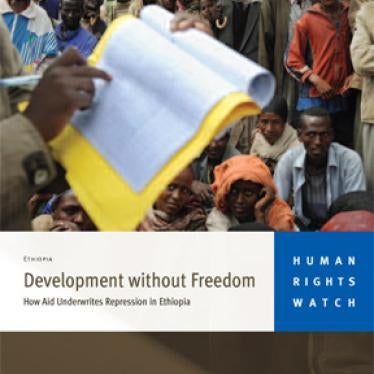(New York) - Ethiopia's international donors should independently investigate allegations that its government is using development aid for state repression, Human Rights Watch said today in a letter to the Development Assistance Group, a coordinating body of 26 foreign donor institutions for Ethiopia.
In interviews with 200 people across Ethiopia, Human Rights Watch documented in a report released in October 2010 how Ethiopian government officials routinely discriminate against people viewed as political opposition supporters. The report demonstrated how the government uses state resources, including programs financed by large international donors, to suppress political dissent by conditioning access to essential services on support for the ruling party.
"Donor governments should open an independent investigation of the Ethiopian government's manipulation of aid," said Rona Peligal, Africa director at Human Rights Watch. "Donor governments have a responsibility to taxpayers at home - as well as to Ethiopians in need - to ensure their aid is not contributing to human rights violations."
The Development Assistance Group (DAG) released a joint statement on October 21 responding to Human Rights Watch's 105-page report, "Development without Freedom: How Aid Underwrites Repression in Ethiopia." The donors' group denied that political manipulation of aid was widespread, stating: "We do not concur with the conclusions of the recent HRW report regarding widespread, systematic abuse of development aid in Ethiopia. Our study did not generate any evidence of systematic or widespread distortion."
Human Rights Watch said that the Development Assistance Group provided insufficient basis for its disagreement with the report's findings. The donors have not begun an independent investigation of the abuses. The study referred to in their statement, a desk-based analysis of the monitoring mechanisms of four aid programs commissioned in early 2010, was an "exploratory" assessment, which noted that field research would be needed to verify how the monitoring works in practice.
"Donors can't know the extent of abuses if they haven't properly investigated," Peligal said. "National parliaments should demand a credible, comprehensive investigation and, ultimately, a thorough review of aid policy toward Ethiopia."
Human Rights Watch has not called for the suspension of all development programs, but instead urged donors to suspend certain governance programs until critical benchmarks - like the repeal of repressive laws - are met. These include the Democratic Institutions Program, which provides funding and technical support to government institutions, such as the parliament, in an effort to build domestic accountability. Donors should not continue to finance these programs in the absence of the independent institutions, media, and civil society that are critical for accountability, Human Rights Watch said.
"Assistance to Ethiopia's government has increased while its human rights record has deteriorated," Peligal said. "Donors are contradicting their own principles on human rights and good governance by increasing funding without adequate safeguards."
Background
Ethiopia has demonstrated serious, ongoing backsliding on its respect for human rights since the violent and controversial 2005 elections. At least 200 demonstrators were killed and more than 30,000 people detained in 2005 in the wake of election protests. Since then, the Ethiopian government has steadily closed political space, detained political opposition leaders, harassed independent journalists and civil society activists into silence or exile, and routinely violated the rights to freedom of association and expression.
A new law on civil society activity, passed in 2009, bars nongovernmental organizations from working on issues related to human rights, good governance, and conflict resolution if they receive more than 10 percent of their funding from foreign sources. The law has forced most independent human rights groups to close, significantly scale down their operations, or change their mandate and activities. Several of the most prominent Ethiopian human rights activists have fled the country.
In May, Ethiopia's ruling party won more than 99.6 percent of parliamentary seats in an election that "fell short of international standards," European observers said. The European Union monitoring team, which was refused access to Ethiopia to present the final report on November 8, also criticized in its report the ruling party's misuse of state resources during the election campaign.
At the same time that Ethiopia's human rights situation has worsened, foreign donors have ramped up development assistance. Between 2004 and 2008, international development aid to Ethiopia doubled to more than US$3.3 billion annually, making Ethiopia one of Africa's largest recipients of international aid.






